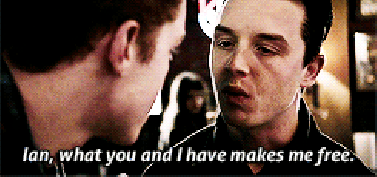
Welcome to the 22nd article in our 2019 Pride Month Series! Each day in the month of June, we will be highlighting a different member of the LGBTQ+ community who we think is a great example of representation and dynamic characterization. We will focus on fictional characters, celebrities, and activists alike — the positive voices within the LGBTQ+ community and in mainstream media.
Today’s spotlight will focus on Mickey Milkovich from Showtime’s Shameless.
There are two items I should bring to your attention. First, there will be spoilers here, in case you’re not up to date on the series. And second, I want to acknowledge that an argument can be made for Mickey being bisexual. But since he ultimately reveals himself to be gay in his own words, in canon, I’ve decided to spotlight his character as gay.
Shameless is set in Chicago’s South Side and centered around the — let’s call them scrappy — Gallagher family. Mickey Milkovich, portrayed by Noel Fisher, first enters the scene early in season one as the violent delinquent brother of Mandy, who accused closeted Ian Gallagher of assaulting her because he wasn’t interested in her. Eventually, Ian tells Mandy the truth about his sexuality, but Mickey’s distaste for Ian only seems to bloom.
Mickey begins to make regular visits to steal from the convenience store where Ian works — and also carries on a relationship with his equally closeted (and married) boss, Kash. Kash eventually buys a gun at the demand of his wife, but Mickey is able to take it from him when he does finally work up the courage to pull it on him. When Ian confronts Mickey at his house to retrieve the gun, a struggle between them ensues, but their anger quickly morphs into attraction, and the two end up hooking up.
To say the “relationship” between Mickey and Ian is tumultuous may be a tad of an understatement, and Mickey struggles heavily with his sexuality, several times reverting to performative sexual relations with women to attempt to cloud his attraction to Ian.
At the end of season three, we begin to see Ian becoming restless with their secret arrangement, and things come to blows between the two when Ian demands that Mickey admits that he’s gay.

Everything comes to a head in season four when Mickey finally comes out in possibly one of the greatest LGBTQ+ character scenes in television history. Ian gives Mickey an ultimatum: stop denying who he is, or their relationship is over. In one of the most poignant moments of their relationship, the viewers really fall in love with their bond:
Mickey: “Everyone else? Who gives a shit about everybody else? What fucking difference does it make if I lie to them?”
Ian: “‘Cause– because you’re not free.”
Mickey: “Ian, what you and I have makes me free. Not what these assholes know.”

When Ian does get up to leave, Mickey quiets the bar and announces to everyone — including his violently homophobic, just-hours-fresh-out-of-jail father Terry — that he’s gay.

Mickey and Ian share a look as the bar falls silent, and after a few moments, everything goes back to normal. People are talking, dancing, and drinking, and the night moves on, everyone seemingly uncaring — or perhaps unsurprised — about Mickey’s announcement. Unfortunately, after a brief moment of relief and maybe even a little happiness, a full brawl breaks out across the bar when Terry attacks Mickey, and Ian subsequently attacks Terry.
Cops are called, and both Terry and Mickey are arrested. But after Terry is hauled away in a police car for violating his parole, the second officer releases Mickey.
Officer: “If I arrest you, it’s gonna be a lot of paperwork. Keep me in the office all night. I’d rather get home to my husband, Carlos.”
Mickey’s character, sexuality and otherwise, is fascinatingly complex, heartbreaking, and even a little relatable. Growing up in the South Side, his mother deceased and his father either incarcerated or drunk and violent, Mickey seems to have had to take up the mantle for the Milkovich family. He’s fiercely defensive of his family, especially Mandy. And his violent tendencies, while common, are seemingly never without reason.
Mickey displays behavior of suppression due to the toxic masculinity he was raised into, and he often lashes out reflexively as a result. It’s clear he never received the kind of love and affection growing up that he needed and deserved, and so he has a difficult time opening up to people. He exhibits surprisingly intuitive care-taking abilities, with both his infant son Yevgeny and with Ian when he’s diagnosed with bipolar disorder. And he eventually grows to allow himself tender and playful moments with Ian, which are small victories throughout their relationship and throughout his character growth as a whole.

Noel Fisher portrays Mickey in such a raw, real way that it is nearly impossible not to feel what the character is feeling. The performance feels real: the anguish burns, the anger boils, the heartbreak aches, and the love heals. Despite being in less than half of the episodes, Mickey quickly became a fan favorite, no doubt because of Fisher’s stellar performance and dedication to the character.
There is something to be said about actors who clearly understand the nuances of their characters, which affords the audience to be drawn into their story and gives the actors the opportunity to shine…especially in emotionally-driven scenes, which is the good bulk of Fisher’s scenes as Mickey.
Mickey Milkovich may refer to himself as a “big ‘ol ‘mo,” but he’s making leaps and bounds in his acceptance of himself and therefore, within his relationship with Ian. Mickey deserves today’s Pride Spotlight, because he’s a deviation from stereotypical LGBTQ+ characters in television, especially at the time of his introduction in 2011, and he’s the perfect example of sexuality being unrelated to socially-constructed norms for men versus women.
Mickey Milkovich is a lover and protector at heart, but be careful — he’s more likely to cuss at you than he is to kiss you.

Stay tuned for our next installment in our 2019 Pride Month Series tomorrow, and check out the rest of the articles in the series here.

